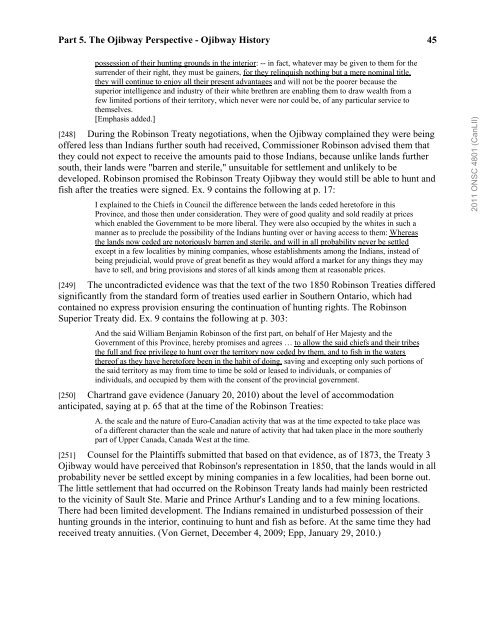Keewatin v. Minister of Natural Resources
Keewatin v. Minister of Natural Resources
Keewatin v. Minister of Natural Resources
- No tags were found...
Create successful ePaper yourself
Turn your PDF publications into a flip-book with our unique Google optimized e-Paper software.
Part 5. The Ojibway Perspective - Ojibway History 45possession <strong>of</strong> their hunting grounds in the interior: -- in fact, whatever may be given to them for thesurrender <strong>of</strong> their right, they must be gainers, for they relinquish nothing but a mere nominal title,they will continue to enjoy all their present advantages and will not be the poorer because thesuperior intelligence and industry <strong>of</strong> their white brethren are enabling them to draw wealth from afew limited portions <strong>of</strong> their territory, which never were nor could be, <strong>of</strong> any particular service tothemselves.[Emphasis added.][248] During the Robinson Treaty negotiations, when the Ojibway complained they were being<strong>of</strong>fered less than Indians further south had received, Commissioner Robinson advised them thatthey could not expect to receive the amounts paid to those Indians, because unlike lands furthersouth, their lands were "barren and sterile," unsuitable for settlement and unlikely to bedeveloped. Robinson promised the Robinson Treaty Ojibway they would still be able to hunt andfish after the treaties were signed. Ex. 9 contains the following at p. 17:I explained to the Chiefs in Council the difference between the lands ceded heret<strong>of</strong>ore in thisProvince, and those then under consideration. They were <strong>of</strong> good quality and sold readily at priceswhich enabled the Government to be more liberal. They were also occupied by the whites in such amanner as to preclude the possibility <strong>of</strong> the Indians hunting over or having access to them: Whereasthe lands now ceded are notoriously barren and sterile, and will in all probability never be settledexcept in a few localities by mining companies, whose establishments among the Indians, instead <strong>of</strong>being prejudicial, would prove <strong>of</strong> great benefit as they would afford a market for any things they mayhave to sell, and bring provisions and stores <strong>of</strong> all kinds among them at reasonable prices.[249] The uncontradicted evidence was that the text <strong>of</strong> the two 1850 Robinson Treaties differedsignificantly from the standard form <strong>of</strong> treaties used earlier in Southern Ontario, which hadcontained no express provision ensuring the continuation <strong>of</strong> hunting rights. The RobinsonSuperior Treaty did. Ex. 9 contains the following at p. 303:And the said William Benjamin Robinson <strong>of</strong> the first part, on behalf <strong>of</strong> Her Majesty and theGovernment <strong>of</strong> this Province, hereby promises and agrees … to allow the said chiefs and their tribesthe full and free privilege to hunt over the territory now ceded by them, and to fish in the watersthere<strong>of</strong> as they have heret<strong>of</strong>ore been in the habit <strong>of</strong> doing, saving and excepting only such portions <strong>of</strong>the said territory as may from time to time be sold or leased to individuals, or companies <strong>of</strong>individuals, and occupied by them with the consent <strong>of</strong> the provincial government.[250] Chartrand gave evidence (January 20, 2010) about the level <strong>of</strong> accommodationanticipated, saying at p. 65 that at the time <strong>of</strong> the Robinson Treaties:A. the scale and the nature <strong>of</strong> Euro-Canadian activity that was at the time expected to take place was<strong>of</strong> a different character than the scale and nature <strong>of</strong> activity that had taken place in the more southerlypart <strong>of</strong> Upper Canada, Canada West at the time.[251] Counsel for the Plaintiffs submitted that based on that evidence, as <strong>of</strong> 1873, the Treaty 3Ojibway would have perceived that Robinson's representation in 1850, that the lands would in allprobability never be settled except by mining companies in a few localities, had been borne out.The little settlement that had occurred on the Robinson Treaty lands had mainly been restrictedto the vicinity <strong>of</strong> Sault Ste. Marie and Prince Arthur's Landing and to a few mining locations.There had been limited development. The Indians remained in undisturbed possession <strong>of</strong> theirhunting grounds in the interior, continuing to hunt and fish as before. At the same time they hadreceived treaty annuities. (Von Gernet, December 4, 2009; Epp, January 29, 2010.)2011 ONSC 4801 (CanLII)
















